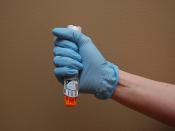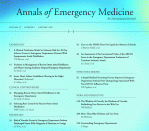In the emergency setting, anaphylaxis is a dangerous, life threatening condition that must be treated in an aggressive and timely fashion. Anaphylaxis is a condition related to acute allergic reactions. Following the body's exposure to the offending allergen, there are common systemic reactions. The most serious reactions involve the respiratory and cardiovascular systems, but the gastrointestinal, dermatologic, and genitourinary systems are often involved causing varied symptoms such as urticaria, flushing, angioedema, bronchospasm, hypotension, cardiac arrythmias, nausea, intestinal cramps, pruritus, and finally uterine cramps. (Physician Assistant, 8/94) The above list is by no means exhaustive, specific symptoms vary from person to person. The same person suffering from several anaphylactic reactions can also present with differing symptoms.
Physiologically speaking, the two main effects of the body's released mediators (IgE) during an anaphylactic reaction are smooth muscle contraction and vasodilatation, which cause most of the body's adverse symptoms. (JAMA, 11/26/82) Since the most life threatening reactions usually involve the respiratory and cardiovascular systems, that is where emergency treatment is focused.
In the cardiovascular system, a combination of vasodilatation, increased vascular permeability, tachcycardia, and arrhythmias can lead to severe hypotension. In the respiratory system, the swelling of tissues along with bronchospasm and increased mucus production are the main cause of death. So, if untreated, anaphylaxis can be fatal as a result of the body's going into what is essentially shock, while simultaneously (and more importantly) being deprived of the oxygen needed to sustain life.
As of today there is one universally accepted treatment for acute anaphylaxis. Epinephrine. Epinephrine is both an alpha and a beta agonist. This makes it the drug optimally suited to treat anaphylaxis. 'Epinephrine will increase vascular resistance, reduce vascular permeability, produce bronchodilation and increase cardiac output.' (Emergency, 10/93)
Epinephrine will directly counteract the potentially life threatening...

